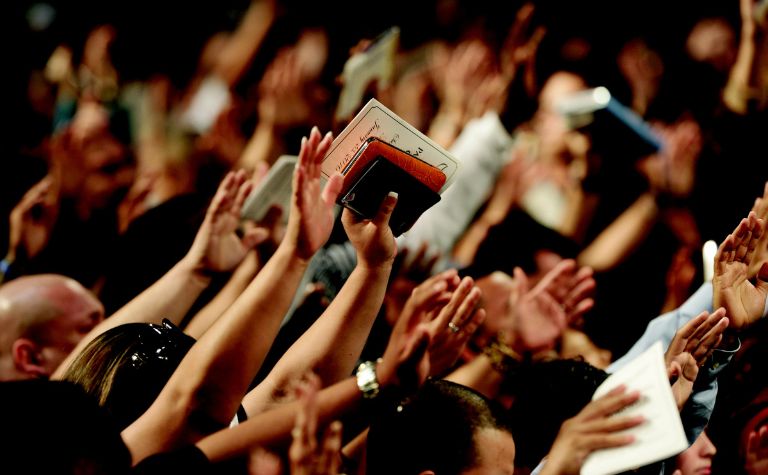In the book of Ephesians, Paul encourages Christians to pray in the Spirit. Jude also instructs believers to pray in the Spirit in his short letter. The context of the phrase in Ephesians is spiritual warfare, and in Jude, its perseverance. Even though the term in Ephesians is simply “the Spirit,” it refers to the “Holy Spirit” as Jude does. Many Bible readers are interested to know what praying in the Spirit means.
The consensus among New Testament scholars is that Christians pray in the Holy Spirit by seeking his direction in their petitions, guidance in their lives, and help for their various needs. Many Pentecostal Christians believe praying in the Spirit refers to speaking in tongues or includes it.
Why is praying in the Spirit important for Christians? How, when, and in what manner does Paul tell believers to pray amid spiritual warfare? How do Pentecostals interpret “praying in the Spirit”? How do non-Pentecostals? Keep reading to learn the answers to these questions and others.
Also see How To Receive Baptism in the Holy Spirit to learn more.

Why is praying in the Spirit important for Christians?
In Ephesians 6:10-18, Paul tells Christians to “put on the whole armor of God” so they can stand against Satan’s schemes (v. 10). Paul mentions the belt of truth, the breastplate of righteousness, the shoes of readiness, the shield of faith, the helmet of salvation, and the sword of the Spirit. The sword of the Spirit, which refers to the Bible, is also connected to praying in the Spirit.
The importance of prayer in spiritual warfare
Paul writes, “The sword of the Spirit, which is the word of God, praying at all times in the Spirit, with all prayer and supplication” (v. 17b-18a, emphasis added). Studying the Bible, which is a primary way that God speaks to people today, and prayer, which is how people talk to God, are necessary to win spiritual battles. Paul’s instruction includes when and how to pray and what kind of prayers to say.
- When should Christians pray? Believers should pray to God “at all times.” This is similar to Paul’s instructing the Thessalonians to “pray without ceasing” (1 Thess. 5:17).
- How should Christians pray? Believers should pray “in the Spirit.” This instruction is similar to Jude’s encouragement to build “yourselves up in your most holy faith and praying in the Holy Spirit” (v. 20).
- What kinds of prayers should Christians say? Believers should approach God with “all prayer and supplication.” The NIV reads, “with all kinds of prayers and requests.” Examples of different kinds of prayers are petition, praise, lament, and confession.
As the beginning of the passage indicates, prayer is a vital part of being “strong in the Lord and in the strength of his might” (Eph. 6:10). It is a weapon that defeats Satan and keeps believers from sin. The kind of prayer that strengthens Christians and leads to their victory in spiritual warfare isn’t thoughtlessly formulaic, cliche-ridden, or unnecessarily repetitive.
Instead, it’s inseparably connected to a believer’s relationship with God and the two-way communication of bible reading and prayer. These disciplines aren’t “works” but commitments that enhance faith in God, strength amid temptation, and wisdom for decision-making. Though Paul doesn’t refer to prayer as a piece of armor in the passage, it’s critical for believers “to withstand in the evil day” (v. 13b).
| Greek phrase | ἐν Πνεύματι |
| Transliteration | en pneumati |
| Translation | “in the Spirit” |
| Speech parts | preposition and noun |
| Preposition range | “by,” “with,” “in”; many more |
| Noun range | Spirit (i.e Holy); spirit |
| Related to prayer | Eph. 6:18; Jude 20 |
| Related to other things | e.g. “walking in the Spirit” |
Oswald Chambers writes, “The prayer of the feeblest saint who lives in the Spirit and keeps right with God is a terror to Satan. The very powers of darkness are paralyzed by prayer; no spiritualistic séance can succeed in the presence of a humble praying saint. No wonder Satan tries to keep our minds fussy in active work till we cannot think in prayer.”
Also see How Does the Holy Spirit Help People? to learn more.

Is praying in the Spirit speaking in tongues?
Christians from different traditions debate if the phrase “in the Spirit” includes speaking in tongues. Though Paul never uses the term in Ephesians, including the passage on the Armor of God, some believe the text implies it. Some Pentecostal interpreters believe “in the Spirit” is synonymous with speaking in tongues. Others in the same tradition think it includes speaking in tongues.
For example, Pentecostal scholar Gordon Fee writes that “in the Spirit” means “that form of prayer in which the Spirit assumes a special role in the praying, especially, though probably not exclusively, praying in tongues.” Fee adds that Christians need to “take the enemy on by Spirit-empowered proclamation and by Spirit-inspired praying… only ‘praying in the Spirit’ will suffice in such conflict.” [1]
Paul’s words in 1 Corinthians 14:14-15 inform Fee’s interpretation: “For if I pray in a tongue, my spirit prays but my mind is unfruitful. What am I to do? I will pray with my spirit, but I will pray with my mind also; I will sing praise with my spirit, but I will sing with my mind also.”
Also see What Happens To You Spirit When You Die? to learn more.

How do non-Pentecostal scholars interpret praying in the Spirit?
Non-Pentecostal theologian, Peter O’Brien, writes that Christians “are to pray to the Father, prompted and guided by the Spirit. This is not a reference to praying in tongues, since not all Christians are expected to engage in such prayer, but has to do with specific requests offered through the Spirit by every believer involved in the spiritual warfare.” [2]
Non-Pentecostal commentator, S.M. Baugh, writes that praying in the Spirit “does not mean prayer in Spirit-enabled foreign languages or ‘tongues.’ But all genuine believers dwell in the Holy Spirit (so Rom. 8:9) as the atmosphere of the inaugural new creation… Paul points to prayer that relies on the Holy Spirit to convey and express one’s desires and love (Phil. 2:1; Col. 1:8) while intervening for one’s brothers and sisters in the Lord before the throne of grace…” [3]
Agreeing to disagree about speaking in tongues.
Pentecostals and non-Pentecostal Christians won’t soon reconcile all their interpretative differences. Nevertheless, they can each acknowledge their doctrinal unity over the Trinity, the person and work of Jesus Christ, salvation, the inspiration of the Bible, and the person of the Holy Spirit.
The tradition can also unite over the importance and power of prayer in the life of a Christian; as Wesleyan-Methodist minister Samuel Chadwick once said, “The one concern of the devil is to keep Christians from praying. He fears nothing from prayerless studies, prayerless work, and prayerless religion. He laughs at our toil, mocks at our wisdom, but trembles when we pray.”
Also see What Does It Mean To Worship In Spirit and Truth? to learn more.
References:
[1] God’s Empowering Presence by Gordon Fee. p. 730-731.
[2] The Letter to the Ephesians by Peter O’ Brien. PNTC. p. 484-485.
[3] Ephesians by S.M. Baugh. EEC. p. 558-559.
Related Questions
The Holy Spirit, the third person of the Trinity, has a unique role in the life of a Christian. In cooperation with the Father and the Son, Jesus Christ, he convicts non-believers of sin (John...
One of the most common questions people have about the Holy Spirit is what it means to blaspheme him. People are curious about this because they know it's an unforgivable sin, and some fear they have...
